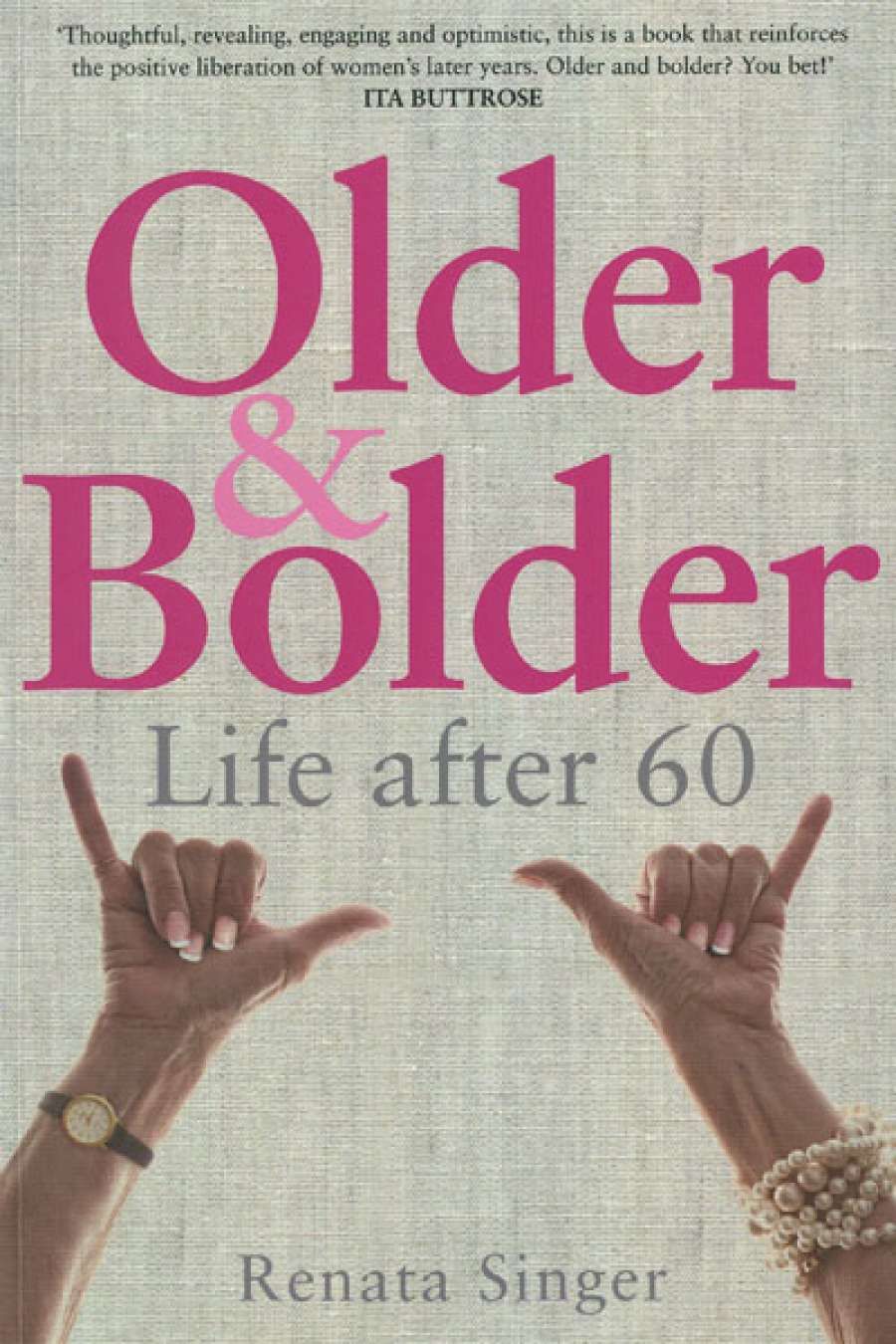
- Free Article: No
- Contents Category: Society
- Custom Article Title: Ilana Snyder reviews 'Older and Bolder' by Renata Singer
- Book 1 Title: Older and Bolder
- Book 1 Subtitle: Life After 60
- Book 1 Biblio: Melbourne University Press, $34.99 pb, 281 pp, 9780522865950
Renata Singer's Older and Bolder: Life after 60 is part of that tradition. In 2015 the world is still struggling with the legacy of those times; not all the reforms have eventuated. A product and survivor of that period, Singer takes a positive and empowering approach to the well-being of older women by providing valuable information that draws on the work of experts, the voices of the women she interviewed, and her own wise opinions on a range of issues. These include: working, love and loss, being well, money matters, keeping up appearances, living independently or in care, technology, and sex and remarriage. A guide to living as an older woman, her book is authoritative, reassuring, and empathetic. It is imbued with a belief in the need for solidarity as women grow older; women's experiences are not an individual matter as ageism is alive and well.
The impetus for the book was Singer's search for role models. The book opens with a story about Bel Kaufman, the granddaughter of the famous Yiddish writer Sholem Aleichem and author of the 1965 bestseller, Up the Down Staircase. When Singer heard Kaufman speak in New York, she was inspired by her glamour at the age of one hundred. Kaufman was in high heels, blonde hair piled on her head. Funny and witty, she stood on those heels for twenty minutes and delivered an incredible keynote without notes. Writes Singer: 'I love her. Now that I have such a role model I want to live to be 100.' She argues in the book that old women are not only working, exhibiting, publishing, performing, and competing, but they are also having a great time.
 Renata Singer
Renata Singer
Singer spoke to twenty-eight women, aged between eighty-five and one hundred, from different backgrounds and economic circumstances, with contrasting life stories. None of these women was sitting around waiting for death. Among those she interviewed were Margaret Fulton, food and cooking guru, now ninety-one, who continues to be involved in the industry; Margaret Barnett, eighty-eight, medical doctor and researcher, who was forced to retire at sixty-five and found the adjustment difficult; Rose Stone, ninety-three, who emigrated to Australia just before the beginning of World War II and joined the women's movement; and Kali Paxinos, eighty-eight, who found a career in mental health. Singer shines a light on their achievements, fears, and losses.
According to Singer, for the first time in history women turning sixty can expect to live for another three decades. A drab existence of retirement, disease, and disconnection is not an option for this generation of women. Her book is aimed at the anxieties of women turning sixty. She asks her readers to examine their ingrained perceptions and negative conditioning, often based on myths and outdated stereotypes. In their place, she offers stories of active, creative women in old age that challenge these oppressive ways of thinking.
'A product and survivor of that period, Singer takes a positive and empowering approach to the well-being of older women'
Through research, Singer reveals how these anxieties are often misplaced. For example, studies have established that there is a U-curve of happiness. Women begin happy, becoming less and less happy until they reach the base of the curve in their thirties, forties, and fifties, but they climb up again as they get older. For most women, studies show that they are the happiest they have ever been as they grow older. Although it seems that economic prosperity plays little or no part in their levels of happiness, Singer acknowledges that work is very important for women's well-being and contentment. Work provides purpose and a sense of being part of the community, and it doesn't have to be paid work.
Singer slips between different points of view – 'we', 'I', 'you', 'they' – sometimes within a single paragraph. A more consistent authorial position would have enhanced the book's cohesiveness. She also tells her readers what to do, most apparent in the 'hot tips' at the end of each chapter. This component ensures that the book complies with the self-help genre publishers seem to like but it is the book's least engaging element. However, these are minor quibbles, as it is self-help suffused with a moral conscience. Singer's book brims with energy and insight about growing older and bolder.


Comments powered by CComment